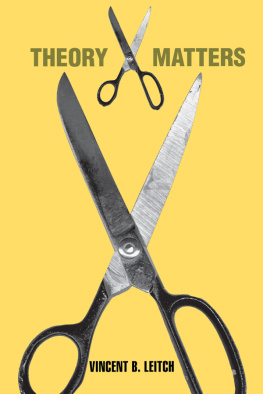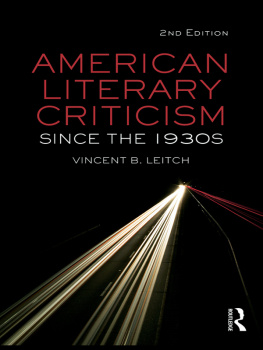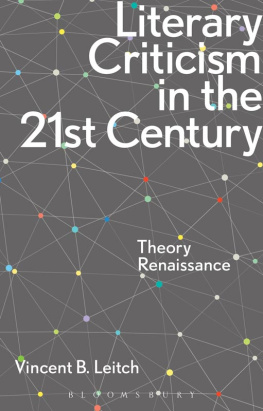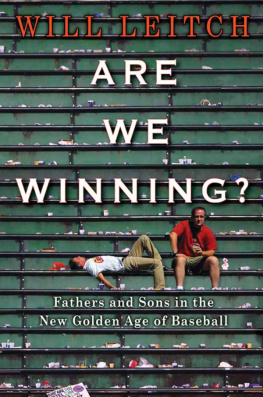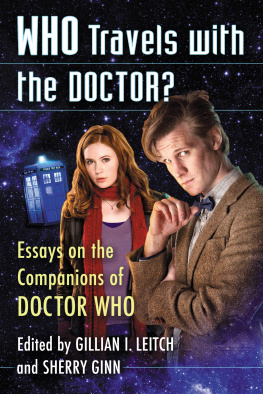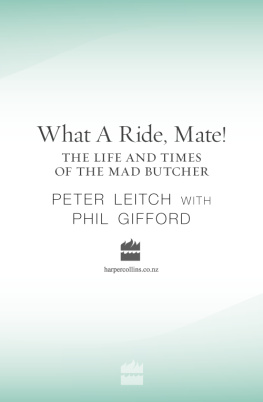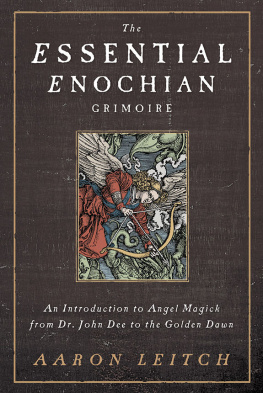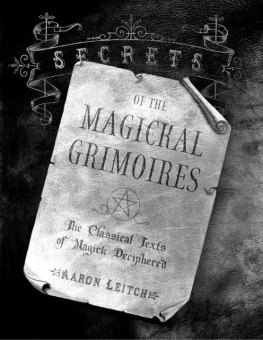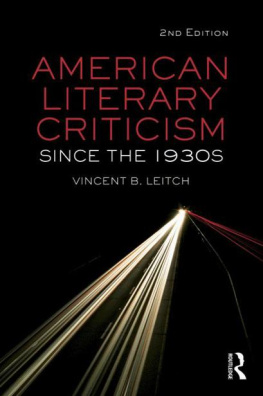Leitch - Theory Matters
Here you can read online Leitch - Theory Matters full text of the book (entire story) in english for free. Download pdf and epub, get meaning, cover and reviews about this ebook. publisher: Taylor & Francis (CAM), genre: Romance novel. Description of the work, (preface) as well as reviews are available. Best literature library LitArk.com created for fans of good reading and offers a wide selection of genres:
Romance novel
Science fiction
Adventure
Detective
Science
History
Home and family
Prose
Art
Politics
Computer
Non-fiction
Religion
Business
Children
Humor
Choose a favorite category and find really read worthwhile books. Enjoy immersion in the world of imagination, feel the emotions of the characters or learn something new for yourself, make an fascinating discovery.
- Book:Theory Matters
- Author:
- Publisher:Taylor & Francis (CAM)
- Genre:
- Rating:5 / 5
- Favourites:Add to favourites
- Your mark:
- 100
- 1
- 2
- 3
- 4
- 5
Theory Matters: summary, description and annotation
We offer to read an annotation, description, summary or preface (depends on what the author of the book "Theory Matters" wrote himself). If you haven't found the necessary information about the book — write in the comments, we will try to find it.
Leitch: author's other books
Who wrote Theory Matters? Find out the surname, the name of the author of the book and a list of all author's works by series.
Theory Matters — read online for free the complete book (whole text) full work
Below is the text of the book, divided by pages. System saving the place of the last page read, allows you to conveniently read the book "Theory Matters" online for free, without having to search again every time where you left off. Put a bookmark, and you can go to the page where you finished reading at any time.
Font size:
Interval:
Bookmark:
THEORY MATTERS
Vincent B. Leitch

First published 2003 by Routledge
Published 2013 by Routledge
2 Park Square, Milton Park, Abingdon, Oxon OX 14 4RN
711 Third Avenue, New York, NY 10017, US
Routledge is an imprint of the Taylor & Francis Group, an informa business
Copyright 2003 by Taylor & Francis Books, Ltd.
Figures 2 and 5 appear courtesy of Back Beat.
All rights reserved. No part of this book may be reprinted or reproduced or utilized in any form or by any electronic, mechanical or other means, now known or hereafter invented, including photocopying and recording, or in any information storage or retrieval system, without permission in writing from the publishers.
Library of Congress Cataloging-in-Publication Data
Leitch, Vincent B., date.
Theory matters / Vincent B. Leitch.
p. cm.
Includes bibliographical references and index.
ISBN 0-415-96716-3 (HB : alk. paper)ISBN 0-415-96717-1
ISBN 978-0-415-96717-4 (pbk)
(PB: alk. paper)
1. CriticismHistory20th century. 2. Literature, ModernHistory and criticismTheory, etc. I. Title.
PN94.L394 2003
801' .95'0904dc21
2003007397
WHAT MOST CHARACTERIZES POSTMODERN CULTURE from the 1970s onwards is disorganization, a word that suggests chaos, but in my usage means disaggregation, resembling geological formations with historical strata in disarrayed kaleidoscopic layers. Neither economics nor politics nor culture today escapes this form. Recent political examples might include all the schems implementing privatization and deregulation and the simultaneous antiquation of both the welfare state and large mainstream political parties, the latter in conjunction with the rise of numerous new social movements. Slogans depicting these phenomena are, on the political right, small is beautiful and, on the left, coalition and micropolitics are best. Well-attested instances of disorganization in other domains range from the deconstruction of Western philosophy and the reconfiguration of identity theory as multiple subject positions in psychology to the incredulity toward metanarratives of historiography and the construal of tradition as infinite intertextuality in literary theory. Common words and phrases in the critical lexicondifference, heteroglossia, contending interpretive communities, rhizome, polylogue, multiversity, and pasticheall point to various kinds of disaggregation. In Theory Matters I argue that culture and in particular theory during postmodern times are marked by disorganization.
The progression in literary studies during recent decades from formalism to poststructuralism to cultural studies, from high theory to posttheory to cultural critique, marks a broad path of disaggregation, which to some implies the death of theory. To an earlier generation, recent theory often looks like advocacy rather than disinterested objective inquiry into poetics and the history of literature. There are a number of deaths one can single out here: the death of theory as poetics and as literary criticism at the hands of various nonliterary tendencies (feminism, race studies, postcolonial criticism); the death of theory as objective disinterested inquiry in favor of cultural critique; the death of the theory of literature as high- or middlebrow aesthetic artifact undermined by lowbrow popular culture, media, and pulp genres; the death of theory as supplier of a professional lingua franca, a set of foundational principles and normative methods of analysis; and, most revealing, the death of theory as a coherent enterprise, field, or subfield given the recent rise of cultural studies.
In retrospect, the formalist period from the 1940s to the 1960s and the poststructuralist period from the 1970s to the 1990s appear comparatively coherent, though one can trace across these decades a line of disorganization in the fields of literary and cultural theory. It is in the 1990s, with the flowering of cultural studies, notably in the United States, that theory has entered a stage of dramatic disorganization so much so that the usual orderly schools-and-movements approach in depicting as well as in teaching theory no longer works. Interestingly, advocates of Birmingham cultural studies, a relatively coherent earlier project coalescing during the 1970s, complain bitterly that U.S. cultural studies has become a front for a wide range of disparate practices. What most strikingly typifies this recent phase of theory disorganization is the rise of numerous discrete subfields more or less associated with cultural studies, such as media studies, science studies, subaltern studies, trauma studies, whiteness studies, fashion studies, food studies, disability studies, leisure studies, narrative studies, globalization studies, indigenous studies, border studies, urban and community studies, queer studies, visual culture studies, animal studies, and body studies. Add to this list more established fields such as film studies, American studies, gender studies, and postcolonial studies, plus indeterminate fields, for example, legal studies and cognitive studies, and you have a cursory inventory of today's cultural studies. In this way, I would argue that cultural studies is the postmodern discipline par excellence, disorganized in the extreme.
Most of the fields and subfields just enumerated have their own key terms, leading texts, research problems, major figures, archives and histories, journals, conferences, university press series, theoretical wings, and so on. Few are departmentalized or well-funded, existing in various flexible margins of today's modern university, which itself has undergone disaggregation since the 1960s. I do not dwell upon the disorganization of the multiversity, a topic much written about in recent Suffice it to say, insofar as each subfield named above is interdisciplinary or transdisciplinary or antidisciplinary, it contributes to the postmodern disorganization of the modern bureaucratic departmentalized university.
How is theory positioned in relation to all these recent reconfigurations, particularly of cultural studies? To reiterate, each field and subfield has its own distinctive theoretical corpus. On the other hand, there exist numerous overlaps between and among fields, as, for example, the work of Michel Foucault, which finds use in philosophy, literary studies, body studies, queer theory, and more. In this connection, there is also the noteworthy rise to prominence of the crossover text that innovatively links multiple segments of (sub)fields. Gayatri Spivak pioneered this genre when she grafted onto deconstruction both Marxism and feminism from a Third World perspective. Numerous such complex combinations are possible and everywhere in evidence. The point is the disorganization of theory is not another sad contemporary instance of death by Balkanization, but rather of expansion through combination and proliferation. It is also worth pointing out, however, that certain theorists regard the recent expansion of theory as a sad spectacle, implying dilution, vulgarization, loss of vigor, and death.
The new postmodern interdisciplines challenge the autonomous discipline or, more precisely, each discipline per se contains, it turns out, ineradicable elements of other disciplines. And although discrete disciplines may conveniently join like biology and chemistry, biology and chemistry themselves change in the process. Physics has mathematics, astronomy, and chemistry as both neighbors and unwanted guests. Literary studies by its very nature is entangled indissolubly with a half dozen or more disciplines from history and mythology to linguistics, anthropology, and beyond. Interdisciplinarity during postmodern times designates the unstable intermixtures of the disciplines. Where does this leave theory? If I say, all over the place, I am sure you will at this point grasp my argument, one that I develop at greater length in on postmodern interdisciplinarity.
Font size:
Interval:
Bookmark:
Similar books «Theory Matters»
Look at similar books to Theory Matters. We have selected literature similar in name and meaning in the hope of providing readers with more options to find new, interesting, not yet read works.
Discussion, reviews of the book Theory Matters and just readers' own opinions. Leave your comments, write what you think about the work, its meaning or the main characters. Specify what exactly you liked and what you didn't like, and why you think so.

